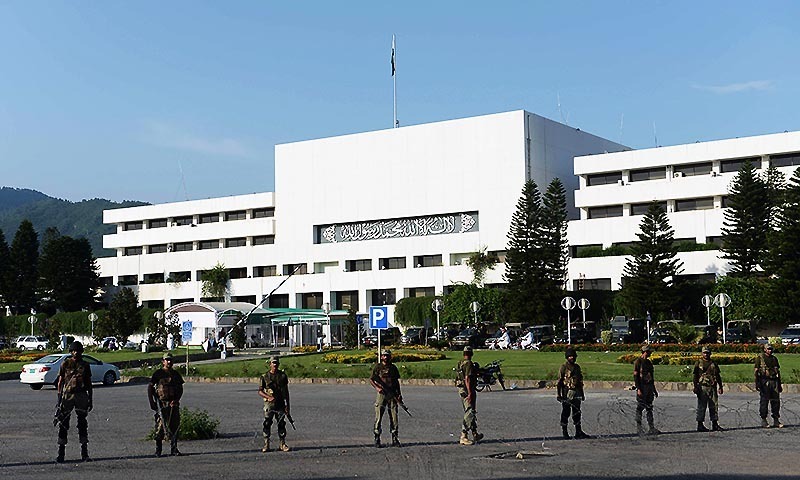The current state of political polarization in Pakistan has been deeply affecting the fabric that holds society together. The future success or failure of this country will depend largely upon whether its people can find some common ground within their differences, but it seems increasingly difficult when we’re surrounded every day by evidence that shows the lack of compromise and civility.
Political polarization is characterized by a widening gap between people with different political views and a growing feeling of animosity and mistrust between them. This can lead to social and political division and even violence. Political polarization is a major problem in many countries around the world, and it is one of the biggest challenges facing democracy today. Social media is often blamed for exacerbating the problem, as it gives people a platform to share their political views without engaging in civil discourse. This can lead to people becoming further entrenched in their beliefs and less likely to listen to opposing viewpoints.
Read more: The social polarization and Pakistan’s present political turmoil
What is political polarization?
Political polarization can be based on issues of human rights, economic crisis, religious views, or any other issue that gains critical importance in society. These issues can be within the system or about the system itself; for example, the legitimacy or extent of power enjoyed by an institution may also lead to polarizing views. Pakistan has been a polarized society since its inception; from the making of constitutions to deciding the modes and functions of institutions in the political system, everything has been debated and contended by the elite.
However, in recent times, political polarization seems to have reached an unprecedented high as people, especially young people who comprise 60% of the country’s population, actively participate in political debates. Political polarization is ever more palpable on the individual level; from colleges and universities to families, the divide in views coupled with intolerance for opposition has become common.
In recent years, there has been a wave of political polarization across the globe, some studies associate COVID-19 and its impact with the increased polarization. In times of crisis, people question the system, policies and those in power leading to a greater debate on the issues and multiple perspectives. Although Pakistan fared better during COVID-19, the aftermath of the crisis has resulted in record inflation and public discontent in the country. Furthermore, the political instability because of a no-confidence motion, the questions about the role of powerful institutions and an overall unstable system have further damaged the economy.
When these political and economic crises are felt by an individual, they respond through public protests or seek explanations from political leadership. However, in Pakistan, the political parties, whether in or out of the government, function merely as propaganda machines leaving the people with more lies and frustration. The stress from such instability enhances polarization, reinforcing the crisis, thus turning the sociopolitical environment into a vicious cycle where crisis and political polarization multiply over time.
Read more: Climate Change and its subsequent sociopolitical unrest
While many issues become the foundation of the divide among the people, the main issues behind the current instability and polarization seem to be whether the former government was ousted because of a foreign conspiracy and the legitimacy of the new coalition government. The country also faced increased politicization of religion and radicalization against minorities. In a country whose foundations are intertwined with religious ideologies, religion remains a sensitive topic that can easily be used to arouse public angst against or support for something.
On the other hand, issues of human rights, a wave of feminism and minority status have also led to an ideological divide among the people. Corruption, poverty, inflation, ethnic conflicts, and enforced disappearances are a few other topics that form the basis of the increased political polarization in the country. However, not all divide is evil; debates are necessary for the evolution of a democratic society.
The problem begins with intolerance and a lack of reason in debates
Social media has empowered individuals to vocalize their support for or discontent over any issue. Social media algorithms create ideological bubbles where people are bombarded with information and propaganda that matches their views, this leads to more polarization and intolerance for opposing views. Mainstream media has become part of the political polarization where channels openly support one party or another. Pakistani people are deprived of unbiased opinions or information.
Read more: Revamping of Pakistan’s political system
When all info becomes propaganda, it becomes difficult to differentiate between manipulation and guidance. The resultant frustration is what the Pakistani polity is undergoing, a state of cut-throat political polarization. The solution lies in education and debates based on reason and evidence. Hope lies in honing a constructive debate culture that can put an end to senseless political attacks and give people a sense of safety.
Muhammad Adnan is a journalist and researcher. The views expressed in this article are the author’s own and do not necessarily reflect the editorial policy of Global Village Space.














